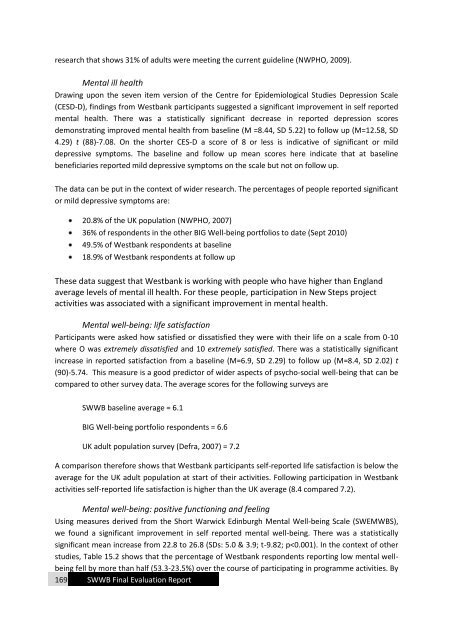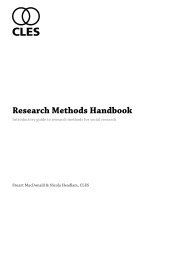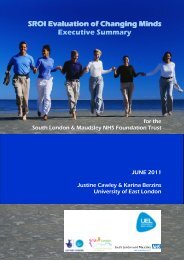Aim and objectives of the report - CLES
Aim and objectives of the report - CLES
Aim and objectives of the report - CLES
- No tags were found...
Create successful ePaper yourself
Turn your PDF publications into a flip-book with our unique Google optimized e-Paper software.
esearch that shows 31% <strong>of</strong> adults were meeting <strong>the</strong> current guideline (NWPHO, 2009).Mental ill healthDrawing upon <strong>the</strong> seven item version <strong>of</strong> <strong>the</strong> Centre for Epidemiological Studies Depression Scale(CESD-D), findings from Westbank participants suggested a significant improvement in self <strong>report</strong>edmental health. There was a statistically significant decrease in <strong>report</strong>ed depression scoresdemonstrating improved mental health from baseline (M =8.44, SD 5.22) to follow up (M=12.58, SD4.29) t (88)-7.08. On <strong>the</strong> shorter CES-D a score <strong>of</strong> 8 or less is indicative <strong>of</strong> significant or milddepressive symptoms. The baseline <strong>and</strong> follow up mean scores here indicate that at baselinebeneficiaries <strong>report</strong>ed mild depressive symptoms on <strong>the</strong> scale but not on follow up.The data can be put in <strong>the</strong> context <strong>of</strong> wider research. The percentages <strong>of</strong> people <strong>report</strong>ed significantor mild depressive symptoms are:20.8% <strong>of</strong> <strong>the</strong> UK population (NWPHO, 2007)36% <strong>of</strong> respondents in <strong>the</strong> o<strong>the</strong>r BIG Well-being portfolios to date (Sept 2010)49.5% <strong>of</strong> Westbank respondents at baseline18.9% <strong>of</strong> Westbank respondents at follow upThese data suggest that Westbank is working with people who have higher than Engl<strong>and</strong>average levels <strong>of</strong> mental ill health. For <strong>the</strong>se people, participation in New Steps projectactivities was associated with a significant improvement in mental health.Mental well-being: life satisfactionParticipants were asked how satisfied or dissatisfied <strong>the</strong>y were with <strong>the</strong>ir life on a scale from 0-10where O was extremely dissatisfied <strong>and</strong> 10 extremely satisfied. There was a statistically significantincrease in <strong>report</strong>ed satisfaction from a baseline (M=6.9, SD 2.29) to follow up (M=8.4, SD 2.02) t(90)-5.74. This measure is a good predictor <strong>of</strong> wider aspects <strong>of</strong> psycho-social well-being that can becompared to o<strong>the</strong>r survey data. The average scores for <strong>the</strong> following surveys areSWWB baseline average = 6.1BIG Well-being portfolio respondents = 6.6UK adult population survey (Defra, 2007) = 7.2A comparison <strong>the</strong>refore shows that Westbank participants self-<strong>report</strong>ed life satisfaction is below <strong>the</strong>average for <strong>the</strong> UK adult population at start <strong>of</strong> <strong>the</strong>ir activities. Following participation in Westbankactivities self-<strong>report</strong>ed life satisfaction is higher than <strong>the</strong> UK average (8.4 compared 7.2).Mental well-being: positive functioning <strong>and</strong> feelingUsing measures derived from <strong>the</strong> Short Warwick Edinburgh Mental Well-being Scale (SWEMWBS),we found a significant improvement in self <strong>report</strong>ed mental well-being. There was a statisticallysignificant mean increase from 22.8 to 26.8 (SDs: 5.0 & 3.9; t-9.82; p









